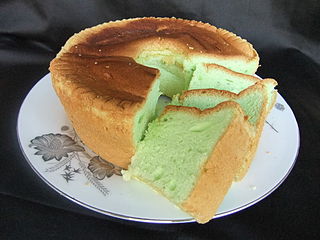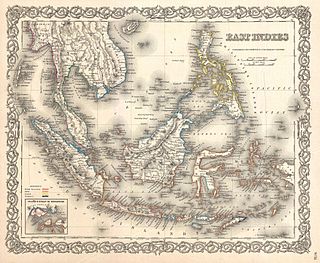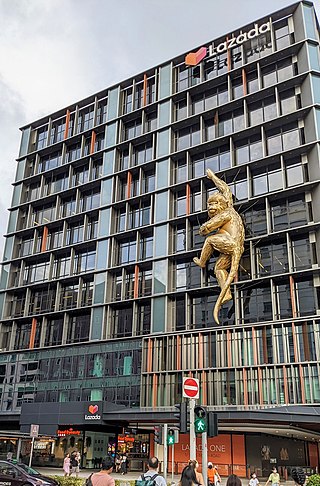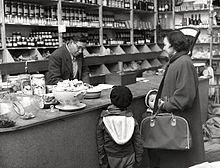
Dutch New Guinea or Netherlands New Guinea was the western half of the island of New Guinea that was a part of the Dutch East Indies until 1949, later an overseas territory of the Kingdom of the Netherlands from 1949 to 1962. It contained what are now Indonesia's six easternmost provinces, Central Papua, Highland Papua, Papua, South Papua, Southwest Papua, and West Papua, which were administered as a single province prior to 2003 under the name Irian Jaya, and now comprise the Papua region of the country.

The East Indies is a term used in historical narratives of the Age of Discovery. The Indies refers to various lands in the East or the Eastern Hemisphere, particularly the islands and mainlands found in and around the Indian Ocean by Portuguese explorers, soon after the Cape Route was discovered. Nowadays, this term is broadly used to refer to the Malay Archipelago, which today comprises the Philippine Archipelago, Indonesian Archipelago, Borneo, and New Guinea. Historically, the term was used in the Age of Discovery to refer to the coasts of the landmasses comprising the Indian subcontinent and the Indochinese Peninsula along with the Malay Archipelago.

In non-Asian countries, an Asian supermarket largely describes a category of grocery stores that focuses and stocks items and products imported from countries located in the Far East.

Pasar malam is an Indonesian and Malay word that literally means "night market". A pasar malam is a street market in Indonesia, Malaysia, Brunei and Singapore that opens in the evening, usually in residential neighbourhoods. Pasar malams are culturally very similar to night markets in Asian countries such as China, Thailand, Taiwan, Vietnam, South Korea and India.

The Dutch colonial empire comprised the overseas territories and trading posts controlled and administered by Dutch chartered companies—mainly the Dutch East India Company and the Dutch West India Company—and subsequently by the Dutch Republic (1581–1795), and by the modern Kingdom of the Netherlands after 1815. It was initially a trade-based system which derived most of its influence from merchant enterprise and from Dutch control of international maritime shipping routes through strategically placed outposts, rather than from expansive territorial ventures. The Dutch were among the earliest empire-builders of Europe, following Spain and Portugal and one of the wealthiest nations of that time.

A warung is a type of small family-owned business — a small retail, eatery or café — in Indonesia. A warung is an essential part of daily life in Indonesia. Over the passage of time, the term warung has shifted somewhat — especially among foreign visitors, expatriates, and people abroad — to refer more specifically to a modest Indonesian eatery or a place that sells Indonesian retail items. But for the majority of Indonesians, it still refers to a small, neighborhood convenience shop, often a front room or booth in a family's home.

Pandan cake is a light, fluffy, green-coloured sponge cake flavoured with the juices of Pandanus amaryllifolius leaves. It is also known as pandan chiffon. The cake is popular in Indonesia, Malaysia, Singapore, Vietnam, Cambodia, Laos, Thailand, Sri Lanka, Hong Kong, China, and also the Netherlands, especially among the Indo community, due to its historical colonial ties with Indonesia. It is similar to the buko pandan cake of the Philippines, but differs in that it does not use coconut.

Spekkoek is a type of Indonesian layer cake. It was developed during colonial times in the Dutch East Indies. The firm-textured cake is an Indo (Dutch-Indonesian) version of the European multi-layered spit cake. However it is not baked on a rotating spit, and contains a mix of Indonesian spices, such as cardamom, cinnamon, clove, mace and anise. The cake is made of flour and yolk and is rich in butter or margarine.

Totok is an Indonesian term of Javanese origin, used in Indonesia to refer to recent migrants of Arab, Chinese or European origins. In the eighteenth and nineteenth centuries it was popularised among colonists in Batavia, who initially coined the term to describe the foreign born and new immigrants of "pure blood" – as opposed to people of mixed indigenous and foreign descent, such as the Peranakan Arabs, Chinese or Europeans.

The Dutch East Indies, also known as the Netherlands East Indies, was a Dutch colony with territory mostly comprising the modern state of Indonesia. After declaring independence on 17 August 1945, Indonesia was largely internationally recognized as independent beginning in 1949. In the Anglo-Dutch Treaty of 1824, the Dutch ceded the governorate of Dutch Malacca to Britain, leading to its eventual incorporation into Malacca (state) of modern Malaysia.

Indos are a Eurasian people of mixed Indonesian and European descent. The earliest evidence of Eurasian communities in the East Indies coincides with the arrival of Portuguese traders in the 16th century. Eurasian communities, often with distinct, specific names, also appeared following the arrival of Dutch (VOC) traders in the 17th and 18th century.

Pasar Baru is an subdistrict in the Sawah Besar district in Central Jakarta, Indonesia. It has postal code of 10710.

The economic history of Indonesia is shaped by its geographic location, its natural resources, as well as its people that inhabited the archipelago that today formed the modern nation-state of the Republic of Indonesia. The foreign contact and international trade with foreign counterparts had also shaped and sealed the fate of Indonesian archipelago, as Indians, Chinese, Arabs, and eventually European traders reached the archipelago during the Age of Exploration and participated in the spice trade, war and conquest.

Indonesia is the common and official name to refer to the Republic of Indonesia or Indonesian archipelago; however, other names, such as Nusantara and East Indies are also known. Some names are considered obsolete and confined to certain periods of history, while some might be more geographically specific or general.
The Indo people are Eurasian people living in or connected with Indonesia. In its narrowest sense, the term refers to people in the former Dutch East Indies who held European legal status but were of mixed Dutch and indigenous Indonesian descent as well as their descendants today.
PT Tokopedia is an Indonesian e-commerce company. Tokopedia is a subsidiary of a new holding company called GoTo, following a merger with Gojek on 17 May 2021. It is one of the most visited e-commerce platforms in Indonesia.

Lazada Group is an international e-commerce company and one of the largest e-commerce operators in Southeast Asia, with over 10,000 third-party sellers as of November 2014, and 50 million annual active buyers as of September 2019.

Prawn crackers are a deep-fried snack made from starch and prawn. They are a common snack food in Southeast Asian cuisine, but they are most closely associated with Indonesia. They have also been adapted into East Asian cuisines, where the similar Japanese kappa ebisen (かっぱえびせん) and Korean saeukkang are popular snacks.

Shopee Pte. Ltd., under the trade name "Shopee," is a Singaporean multinational technology company specialising in e-commerce. It is a subsidiary company of Sea Limited. It was launched in 2015 in Singapore, before its global expansion.

Indo cuisine is a fusion cooking and cuisine tradition, mainly existing in Indonesia and the Netherlands, as well as Belgium, South Africa and Suriname. This cuisine characterized of fusion cuisine that consists of original Indonesian cuisine with Eurasian-influences—mainly Dutch, also Portuguese, Spanish, French and British—and vice versa. Nowaday, not only Indo people consume Indo cuisine, but also Indonesians and Dutch people.

















